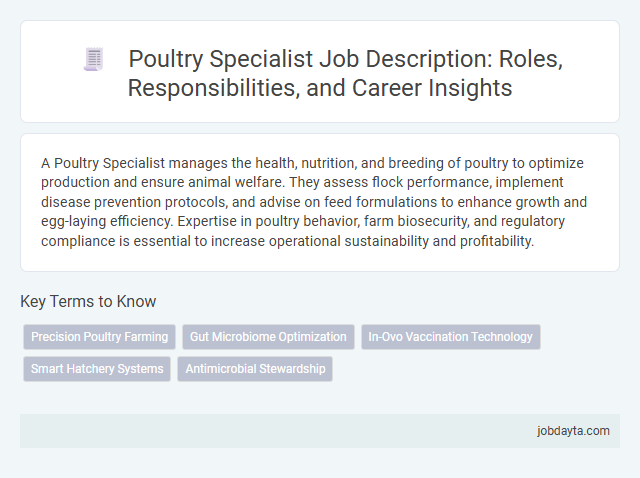A Poultry Specialist manages the health, nutrition, and breeding of poultry to optimize production and ensure animal welfare. They assess flock performance, implement disease prevention protocols, and advise on feed formulations to enhance growth and egg-laying efficiency. Expertise in poultry behavior, farm biosecurity, and regulatory compliance is essential to increase operational sustainability and profitability.
Overview of a Poultry Specialist Role
What does a Poultry Specialist do in the agricultural industry? A Poultry Specialist focuses on the management and care of poultry farms, ensuring optimal health and productivity of chickens, turkeys, and other birds. This role involves monitoring breeding, nutrition, disease control, and environmental conditions to maximize poultry yield and quality.
Key Responsibilities of a Poultry Specialist
A Poultry Specialist manages the health, nutrition, and breeding of poultry flocks to maximize productivity and sustainability. They monitor disease prevention protocols and implement biosecurity measures to protect poultry populations.
They evaluate feed efficiency and growth rates to optimize production outcomes. Regularly analyzing flock performance data helps them provide actionable recommendations to improve poultry operations.
Essential Skills and Qualifications
Poultry specialists play a crucial role in managing the health and productivity of poultry farms. Their expertise ensures optimal bird care, disease prevention, and efficient farm operations.
- Knowledge of Avian Biology - Understanding poultry anatomy, physiology, and lifecycle aids in effective health management and breeding practices.
- Disease Diagnosis and Prevention - Skills in identifying common poultry diseases and implementing vaccination protocols maintain flock health.
- Farm Management Abilities - Proficiency in resource allocation, feed management, and environmental control boosts farm productivity and sustainability.
Daily Tasks and Workflow in Poultry Management
A Poultry Specialist plays a vital role in ensuring the health and productivity of poultry farms. The specialist's daily tasks revolve around monitoring bird health, managing feeding schedules, and maintaining optimal living conditions.
- Health Inspection - You conduct regular checks to identify signs of disease or distress among the flock.
- Feed Management - You oversee the preparation and distribution of balanced diets to promote growth and egg production.
- Environmental Control - You monitor temperature, ventilation, and sanitation to create a comfortable and safe habitat for poultry.
Importance of Poultry Specialists in Agriculture
Poultry specialists play a crucial role in modern agriculture by enhancing the productivity and health of poultry farms. Their expertise ensures optimal breeding, disease control, and nutrition management, directly impacting food quality and supply. Trusting a poultry specialist can significantly improve your farm's efficiency and sustainability.
Career Path and Advancement Opportunities
| Career Path | Advancement Opportunities |
|---|---|
|
|
Challenges Faced by Poultry Specialists
Poultry specialists encounter numerous challenges in managing the health and productivity of flocks. Disease prevention and control remain critical concerns in ensuring sustainable poultry farming.
Maintaining biosecurity to prevent outbreaks of avian diseases requires constant vigilance and updated knowledge. Specialists must balance economic pressures with animal welfare standards while optimizing feed efficiency. Additionally, adapting to climate change impacts on poultry environments poses ongoing difficulties for effective management.
Impact of Technology in Poultry Farming
Technology has transformed poultry farming by enhancing productivity and improving animal health. Advanced monitoring systems and automation allow for precise control of environmental conditions.
Data analytics and IoT devices enable real-time tracking of poultry growth and disease prevention. These innovations lead to higher efficiency, reduced costs, and better quality poultry products.
Salary Expectations and Job Market Trends
Poultry specialists play a critical role in managing the health, nutrition, and productivity of poultry farms. Salary expectations and job market trends for this profession reflect growing demand tied to global food supply needs.
- Salary Range - Poultry specialists typically earn between $45,000 and $75,000 annually depending on experience and location.
- Job Market Growth - Employment opportunities in poultry science are expanding due to rising poultry consumption and advancements in farming technology.
- Skill Demand - Expertise in disease management, breeding, and sustainable practices increases job prospects within the industry.
Your career as a poultry specialist offers promising salary potential and stability influenced by evolving agricultural trends.
Tips for Aspiring Poultry Specialists
Aspiring poultry specialists should focus on gaining hands-on experience with bird health, nutrition, and breeding techniques. Understanding disease prevention and biosecurity measures is essential to maintaining flock productivity and welfare. Staying updated on the latest industry research and technology enhances the ability to optimize poultry management practices.
Related Important Terms
Precision Poultry Farming
A Poultry Specialist in Precision Poultry Farming utilizes advanced technologies such as IoT sensors, real-time data analytics, and automated feeding systems to optimize bird health, growth rates, and environmental conditions. Implementing precision techniques enhances productivity, reduces mortality rates, and ensures sustainable resource management within poultry operations.
Gut Microbiome Optimization
Poultry specialists optimize gut microbiomes by implementing targeted probiotics and prebiotics to enhance nutrient absorption, immune response, and growth performance in poultry flocks. Advanced microbiome analysis techniques help identify beneficial bacterial strains that reduce pathogen colonization and improve overall flock health and productivity.
In-Ovo Vaccination Technology
Poultry specialists utilize in-ovo vaccination technology to enhance disease prevention by administering vaccines directly into the egg during incubation, improving immunization efficiency and reducing manual labor. This method significantly decreases early chick mortality rates and supports large-scale poultry production with precise, uniform vaccine delivery.
Smart Hatchery Systems
Smart hatchery systems utilize IoT sensors and automated climate control to optimize incubation conditions, significantly improving hatch rates and chick health in poultry production. These technologies enable real-time monitoring and data-driven adjustments, reducing mortality and enhancing overall operational efficiency for poultry specialists.
Antimicrobial Stewardship
Poultry specialists play a critical role in antimicrobial stewardship by implementing sustainable practices to minimize the use of antibiotics in poultry production, thereby reducing the risk of antimicrobial resistance. They employ precision diagnostics, proper vaccination protocols, and biosecurity measures to maintain flock health while ensuring responsible antimicrobial use aligned with global food safety standards.
Poultry Specialist Infographic

 jobdayta.com
jobdayta.com